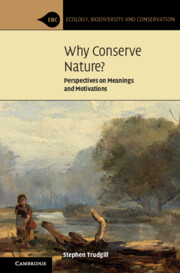
- Cited by 2
-
Cited byCrossref Citations
This Book has been cited by the following publications. This list is generated based on data provided by Crossref.
Christensen, Dana 2023. Computational Thinking to Learn Environmental Sustainability: A Learning Progression. Journal of Science Education and Technology, Vol. 32, Issue. 1, p. 26.
Hernandez, Stephanie Duce, Stephanie Sheaves, Marcus Murray, Nicholas and Adams, Vanessa M. 2024. Predicting the impacts of clearing on vegetation communities: a model-based approach for identifying conservation priorities in Queensland, Australia. Australasian Journal of Environmental Management, Vol. 31, Issue. 1, p. 40.
- Publisher:
- Cambridge University Press
- Online publication date:
- February 2022
- Print publication year:
- 2022
- Online ISBN:
- 9781108961059




